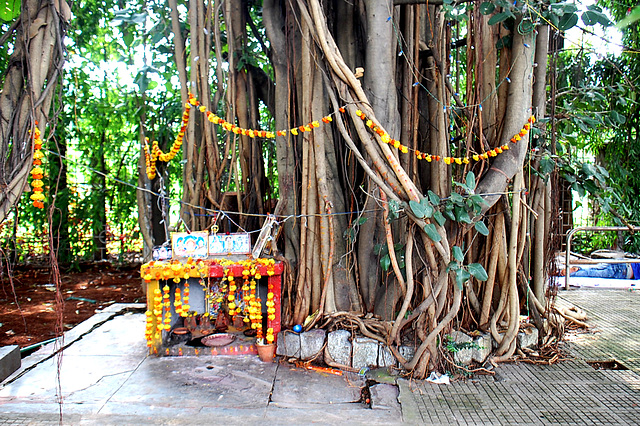Leaning against the wall
Weather report
Weather report
Maintenance Lady
ಐರಾವತ /Airavat ~ Volvo
Pastoral
Forest
Hermit in the mountains
Window view
An old structure -- still standing
Alma mater
Board High School
Alma mater
Facade
Facade
Elemental struggle
At Lalbagh, B'lore
Amul
Sieasta
An Artist's at work
Collapse
A Tree Tale
Peanut seller
Band stand
Narasimha Wadeyar
Artists
Last of the season
Water
Kudramukha
Keywords
Authorizations, license
-
Visible by: Everyone -
All rights reserved
- Photo replaced on 01 Oct 2015
-
114 visits
Banyan Tree


According to Hinduism, worshipping divinity includes worshipping a few plants and trees which are considered holy. These trees boast of a lot of religious significance. Our ancient scriptures also indicate that worshipping plants and trees is indeed an ancient Indian practice. Several Hindu traditions are connected to them. Today also, the modern Indian traditions have an elementary place for worshipping plants and trees as they symbolize life, fertility, prosperity, growth, purity, and divinity.
-o-o-o-o-o-o-o-o-o-o-o-o-o-o-o-o-o-o-o-o-o-o-o-o-o-o-o-o-o-o-o-o-o-o-o-o-o-o-o-o-o
. . . The human condition is a precarious one, and ceremonies involving the presentation of food and drink to the spirits are believed to prevent accidents, cure disease, help women in childbirth, and contribute to the fertility of the earth. ~ ~ “Uncorking the past” ~ Author Patrick McGovern
-o-o-o-o-o-o-o-o-o-o-o-o-o-o-o-o-o-o-o-o-o-o-o-o-o-o-o-o-o-o-o-o-o-o-o-o-o-o-o-o-o
. . . The human condition is a precarious one, and ceremonies involving the presentation of food and drink to the spirits are believed to prevent accidents, cure disease, help women in childbirth, and contribute to the fertility of the earth. ~ ~ “Uncorking the past” ~ Author Patrick McGovern
- Keyboard shortcuts:
Jump to top
RSS feed- Latest comments - Subscribe to the comment feeds of this photo
- ipernity © 2007-2024
- Help & Contact
|
Club news
|
About ipernity
|
History |
ipernity Club & Prices |
Guide of good conduct
Donate | Group guidelines | Privacy policy | Terms of use | Statutes | In memoria -
Facebook
Twitter

Sign-in to write a comment.